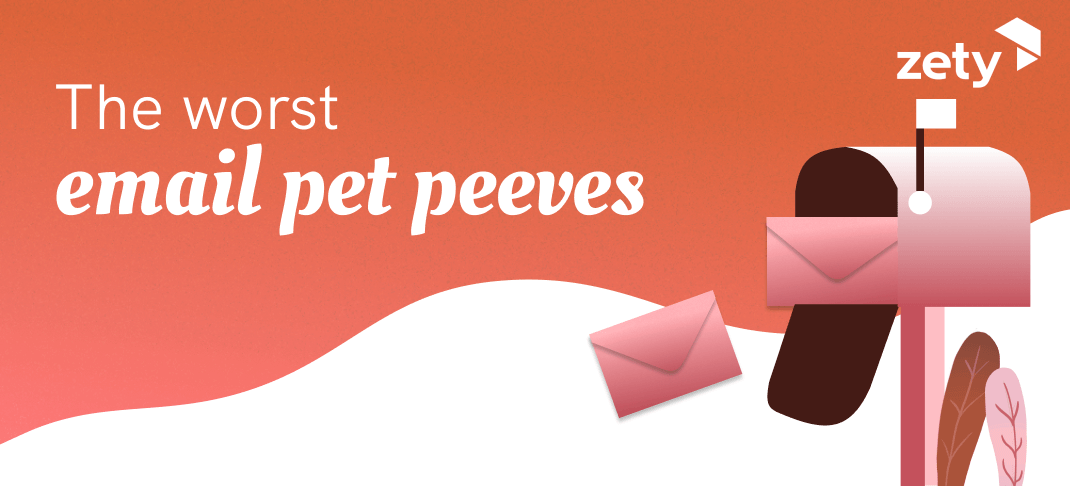Let's Take This Offline–The Most Annoying Email Pet Peeves
Create your CV now
The endless stream of work emails is annoying at the best of times. But now the coronavirus pandemic has forced many of us into working remotely, it’s got even worse. Issues that could’ve been resolved with a quick chat in the office turn into an endless email thread.
Tempers get frayed, friendships tested, all because of a few choice, or not so choice, words. But what are those words and why do they rub us up the wrong way?
To answer that question we surveyed 927 people and created the ultimate list of email pet peeves. Read on to discover which email clichés make us see red, know which phrases to avoid, and make your workday that little bit less stressful.
First, let’s take a look at the extent to which email dominates our lives.
Too Much Time Online
It’s been claimed that millennials are killing emails, along with anything else you care to mention. But let’s just say reports of its demise have been greatly exaggerated. It appears we’re still in-box obsessed.
Most of Us Spend More Than an Hour a Day Checking Emails
Our survey showed a lucky 28% of us spend less than an hour a day checking and replying to emails. 40% of us spend 1–2 hours. 25% of us spend 2–4 hours emailing. And 6% of us are unfortunate enough to spend more than 4 hours a day in their inbox.
And it’s not just us saying it. The McKinsey Global Institute revealed the average employee spends 13 hours a week reading and replying to emails. That’s a total of 650 hours a year, which is more than 26 days. Almost as much time as the 28 days paid leave we’re all entitled to each year.
It’s far too much and it isn’t just annoying, it’s damaging our health. A study published in the journal Information Technology and People revealed that:
Higher e-mail load is associated with higher workload stress… and higher workload stress is associated with higher psychological strain, higher negative emotions and lower organisational commitment.
Researchers at UC Irvine working with the US army backed up this finding. Their research cut off email use for workers for five days, and even that brief “email holiday” made them more productive and less stressed.
Those findings are bad enough, but to add insult to injury it’s clear that work emails bleed into our leisure time too.
More Than 80% of Us Check Work Emails Outside Work Hours
You read that right. A whopping 82.5% of us check our work inbox outside office hours. That matches perfectly with data gathered by Statista in 2018 that showed 82% of people check email outside working hours.
Thankfully, when we dig a little deeper that’s not quite as bad as it sounds.
75% of us only check emails outside business hours once a day, or every few hours. But that still leaves a quarter of respondents checking every hour or immediately after receiving a notification.
It’s clear that work emails are an all-pervasive medium of communication. One with a real impact on our well-being and productivity. We can’t avoid them, but we can definitely minimise their negative effects. The least we can do is not enrage our friends and colleagues with the most common email pet peeves.
So with that noble goal in mind, let’s jump in and discover how you can use email for the power of good. We’ll start with email greetings and sign-offs.
First Impressions–Email Greetings
Never underestimate the power of first impressions. Your very first words set the tone for the rest of your email. Here are the five best and worst email greetings as ranked by our respondents.

Key takeaway? If you want to make a good start this is what you need to do:
- Stick with the classics.
- Don’t forget to add a greeting altogether.
- Don’t be too casual.
- But don’t be too formal either.
As you can see the top 5 greetings strike a happy balance between stuffy formality and terse flippancy.
Time To Say Goodbye—Email Sign-Offs
Don’t ruin that carefully crafted communiqué with a dodgy sign-off. Here are the five best and worst email sign-offs as ranked by our respondents.

Key takeaway? To avoid leaving the reader with a bad taste in their mouth, here’s what you need to do:
- Show gratitude and warmth.
- Don’t be too familiar. You might just get away with saying love if you’re Dot Cotton, otherwise, leave it for casual emails to Mum.
- And again, don’t be too terse. Best and Regards are disliked in isolation, but bring them together into a cheeky Best Regards and you’re onto a winner.
So that covers greetings and sign-offs. How about everything in between? Read on to discover the email phrases that really wind us up.
See Thread Below—Most Annoying Email Clichés
Corporate speak, business jargon, management speak. Whatever you want to call it we’re all guilty of mangling the Queen’s English in the name of workplace communication. Here are the most annoying email clichés as ranked by our respondents.

Key takeaway? Ditch the jargon. As far back as 1908 in How to Do Business By Letter, Sherwin Cody said this:
There is an idea that a certain peculiar commercial jargon is appropriate in business letters. The fact is, nothing injures business more than this system of words found only in business letters.
The advice of our Edwardian ancestors holds true over a century later. Let’s break down exactly what’s wrong with these phrases.
- Just looping in is irritating and doesn’t even make sense when you think about it.
- Let’s take this offline is mildly threatening and has more in common with a school bully having a crafty fag behind the bike sheds than professional workplace communication.
- Referring to previous emails is just passive-aggressive.
- See thread below is lazy, even a brief explanation is better than this cop-out.
- And sorry for the double email? Look, you’ve just annoyed everyone by sending the duplicate email in the first place. Don’t compound the issue by adding a redundant third email to the pile.
So those are the phrases you need to wipe from your work email repertoire. But there’s more than just language at play when it comes to email etiquette. Next, we’ll cover all the other annoying little quirks of business emails.
The Top 10 Email Pet Peeves
We’ve covered the pitfalls of greetings, sign-offs and email clichés. Now let’s take a look at everything else, the behaviours that really drive us crazy when they appear in our inboxes.

Honourable mentions go to using emojis and using coloured fonts in a work email. 60% and 55% of respondents respectively said they were unacceptable.
Key takeaway? It all boils down to good etiquette. And when it comes to etiquette nobody does it better than Debretts, the ultimate authority on good manners since 1769. But they’ve moved with the times too, and offer sage advice for email, or digital communication as they quaintly refer to it.
So let’s analyse the top 10 pet peeves, discuss exactly what’s wrong with them, and share some advice from Debretts along the way.
Using kisses (xxx) in a work email
Far too familiar and casual. Factor in the post #metoo world and the potential for misunderstandings and it’s perfectly understandable why this tops our list.
Having a blank subject line and using a vague subject line
As Debretts points out, a subject line alerts the recipient to the contents of the email and ensures the email gets the appropriate level of attention. It’s also essential for efficient filing and retrieval. Get it wrong and you’re making it harder for your recipients to work efficiently.
All capital letters
We don’t need Debretts to tell us this is rude and shouty. If you need emphasis, try using underlining and italics instead.
Sending an email without proofreading
It’s simple, this makes you look lazy and gives a terrible professional impression. Just like spelling mistakes on a CV, an error-riddled email will massively undermine your credibility.
Using the urgent marker for non-urgent emails
As Debretts pithily explains the urgent marker “should be used discriminately. Otherwise, it will be ignored because of its frequent misuse”. In other words, it’s the boy who cried wolf. Save it for the genuinely important stuff, not just a complaint that your sarnies got stolen out of the kitchen again.
Sending your colleagues memes
Personally, I can’t get enough of memes but there is a time and a place. Your work email account isn’t the place for sharing the latest iteration of ‘woman shouting at cat’.
Using reply all when the issue doesn’t involve everyone copied in
As I mentioned earlier, we’re already spending far too much time emailing as it is. Don’t add to our misery by filling our inbox with messages that have nothing to do with us. Plus, if you’re guilty of this people are more likely to ignore genuine emails from you in the future.
Using slang in a work email
Alright m8 but I’m down with the kids innit? No, it’s really not alright. It makes you look silly and undermines your credibility, just like spelling mistakes. You might call a colleague ‘bruv’ down the pub, but never do it in a work email if you wish to be taken seriously.
Using double exclamation marks (!!)
Like all capitals, it’s rude and shouty. So don’t do it!! See what I did there? Use exclamation marks sparingly and only in single servings.
And there’s one more thing to consider. When you send an unnecessary email you are having a direct effect on the recipient’s productivity. A study in the International Journal of Information Management revealed it takes 64 seconds to recover from an email interruption, regardless of the email’s importance.
Have you got a minute? No, it was just stolen from me by the umpteenth unnecessary email I just received!
If you’re ever in doubt, let this advice from Debretts be your guide.
One step more anonymous than a phone call, electronic communication can tempt us to give rein to our inner troll. Remember that an actual person will read your message, so be just as polite as you would be over the phone.
Conclusion
We’re all struggling under a heavy burden of stress and anxiety as it is. The coronavirus pandemic has turned our lives upside down. Working from home all the time is a challenge and it means we’re emailing more than ever.
Let’s not make matters worse by annoying each other with email bad behaviour. Take note of our findings, avoid the worst email pet peeves and clichés and choose the most popular greetings and sign-offs. We’ll all be happier and more productive as a result.
About Zety’s Editorial Process
Our editorial team has thoroughly reviewed this article to ensure it follows Zety’s editorial guidelines. Our dedication lies in sharing our expertise and providing you with actionable career advice that offers you real value. Every year, the quality of our content attracts 40 million readers to our site. But that’s not all – we conduct original research to gain a detailed understanding of the labour market. We take pride in being cited by top universities and leading media outlets in the UK and worldwide.
Sources
- Thomas Jackson et al., Reducing the effect of email interruptions on employees
- Kitty O. Locker, "As Per Your Request": A History of Business Jargon
- Gloria Mark et al., "A pace not dictated by electrons": an empirical study of work without email
- Jean-Francois Stich et al., E-mail load, workload stress and desired e-mail load: a cybernetic approach
- Debrett’s
- Michael Chui et al., The social economy: Unlocking value and productivity through social technologies
- Share of workers in the United States who check their work e-mails outside of normal work hours as of July 2019, by frequency | Statista
Methodology and Limitations
For this survey, we collected answers from 927 respondents via Amazon's Mechanical Turk. Respondents consisted of 52% males and 48% females. 9.7% of respondents were 24 or younger, 46.5% aged 25–38, 28.8% aged 39–58, and 15% were 59 or older.
This self-report survey investigated respondents’ opinions about email greetings, sign-offs, phrases and other behaviours. They were also asked questions about whether they liked, or disliked a set list of email greetings, sign-offs and phrases. They were then asked whether they considered certain email behaviours acceptable or not.
Given the gender and age makeup of our large sample, this survey can be generalised to the entire population.
Fair Use Statement:
Have you unearthed some new insights into email etiquette and behaviour? You’re welcome to share the results of our survey with your audience for non-commercial use. But we do have one humble request, include a link to this page so our contributors can earn credit for their hard work. Thanks for your support.
About Us
Be the next job applicant to benefit from Zety's career guidance. Save time with professional CV templates and cover letter templates, use the best cover letter builder online, and find out what to write in a cover letter to stand out.
About Zety’s Editorial Process
Our editorial team has thoroughly reviewed this article to ensure it follows Zety’s editorial guidelines. Our dedication lies in sharing our expertise and providing you with actionable career advice that offers you real value. Every year, the quality of our content attracts 40 million readers to our site. But that’s not all – we conduct original research to gain a detailed understanding of the labour market. We take pride in being cited by top universities and leading media outlets in the UK and worldwide.


![Childhood Dream Jobs Study [2021]](https://cdn-images.zety.com/pages/dream_jobs_uk_4.jpg?fit=crop&h=250&dpr=2)
